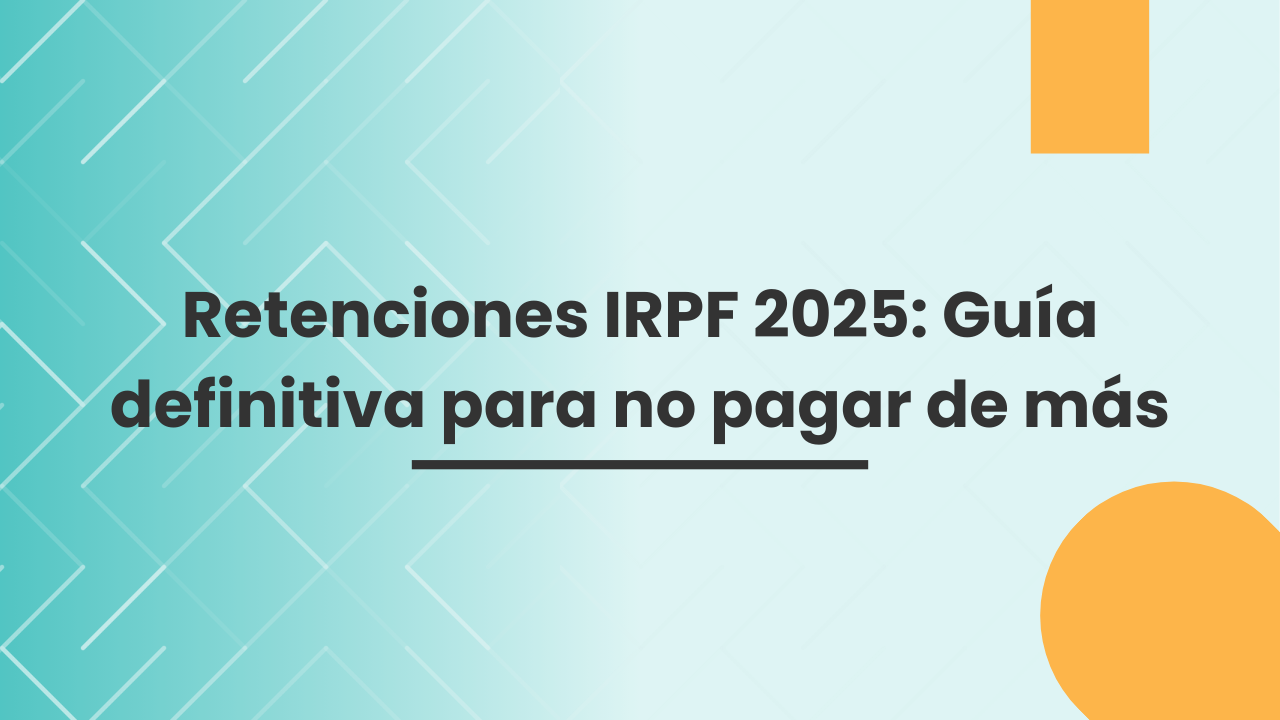Employment Contracts in Spain 2025: Everything You Need to Know

Content:
The Spanish labor market underwent a radical transformation with the labor reform of 2022. If you are an entrepreneur, self-employed, or simply want to know your rights as a worker, keep reading.
Understanding the different types of employment contracts that will be in effect in 2025 is essential to successfully navigating the current employment landscape.
In this post, we'll demystify the complexity of hiring and explain in a clear and simple way everything you need to know about employment contracts in Spain, their characteristics, requirements, and associated tax benefits.
What is an Employment Contract?
Employment contracts are formal agreements between workers and employers that regulate their employment relationship. These documents establish rights and obligations for both parties, including:
Activities and tasks to be performed
Remuneration
Working hours and schedule
Vacation
Probation
Duration of the contract
Both SMEs and self-employed individuals can register as employers with Social Security using Form TA.6, which allows them to hire workers and manage them on payroll after formalizing the corresponding contracts.
The 4 Types of Employment Contracts in Force in 2025
The labor reform that came into force on March 31, 2022, and is included in Royal Decree-Law 32/2021 of December 28 , introduced significant changes to contractual arrangements. Currently, there are four main types of employment contracts :
Permanent contract
Temporary contract
Fixed-term contract
Training contracts
Below, we will analyze each of these contractual types in detail.
Permanent Contract: Job Stability
General Characteristics
Permanent contracts are those with no time limit for the provision of services. They are the preferred contractual modality following the 2022 labor reform, aimed at reducing temporary employment in the Spanish labor market.
Key aspects to keep in mind:
They can be formalized verbally or in writing , although the written form is always recommended for greater legal security.
Either party may request its formalization in writing during the employment relationship.
They offer greater stability and better working conditions for employees.
When Does a Worker Acquire Permanent Status?
They automatically acquire the status of permanent workers:
Workers not registered with Social Security after the legal trial period has elapsed.
Workers with temporary contracts concluded in fraud of law.
Workers who have been employed for more than 24 months in the same position with the same company over a 30-month period (reduced to 18 months after the reform).
Subtypes of Permanent Contracts
There are numerous variants of the permanent contract that adapt to different situations:
Ordinary indefinite contract
For people with disabilities
For people with disabilities in special employment centers
For long-term unemployed people
For workers in situations of social exclusion
For victims of gender violence, domestic violence, terrorism or human trafficking
For family members of self-employed workers
For those over 52 years of age who receive unemployment benefits
For the service of the family home
Permanent contracts assigned to construction work (construction sector)
Temporary Contract: When and How to Use It Correctly
Temporary contracts establish an employment relationship for a specific period of time. The 2022 labor reform significantly limited their use, which is now justified only in specific situations and must clearly specify:
The enabling cause of temporality
The specific circumstances that justify it
The connection with the expected duration
Temporary Hiring Modalities in 2025
Following the disappearance of the contract for work and service, there are two main types of temporary contracts:
1. Contract for Production Circumstances
This contract is established for specific situations such as fluctuations in the company's normal activity:
Maximum duration: 6 months, extendable up to 1 year by sector agreement.
Conversion to permanent contract: If the worker has been employed for more than 18 months with two or more contracts within a two-year period due to production circumstances.
2. Contract for the Replacement of the Worker
It replaces the old interim contract:
Objective: To replace workers with a reserved position, suspended contracts, or during selection processes.
Duration: It coincides with the duration of the cause that supports it.
Requirements: Mandatory written formalization and specification of the name of the replaced person.
New: The substitute person can start work up to 15 days before the absence of the person being replaced.
Other Specific Temporary Contracts
There are other temporary contracts for special situations such as:
Workers in situations of social exclusion
Victims of gender violence or terrorism
People over 52 years of age who receive subsidies
Work of social interest or promotion of agricultural employment
Family home service
People with disabilities
Fixed Discontinuous Contract: The Solution for Seasonal Jobs
The fixed-term contract is open-ended but is used for activities that are carried out intermittently . It is ideal for:
Seasonal or seasonal jobs
Temporary employment agencies (ETT)
Commercial or administrative contracts and subcontracts
This type of contract guarantees the same rights as a permanent contract, including severance pay, but is tailored to activities that are not carried out continuously throughout the year.
The labor reform strengthened this type of contract, giving it priority over temporary contracts for seasonal activities. Furthermore, for seniority purposes, the entire length of the employment relationship is considered, not just the periods actually worked.
Training Contracts: Training and Practice in the Work Environment
Training contracts are designed to facilitate the entry into the labor market of people who are in training or have recently completed their studies. There are two types:
1. Alternating Training Contract
This contract replaces the previous training and apprenticeship contract:
Objective: To allow workers to combine training with paid work.
Scope: Vocational training, university studies or specialties of the National Employment System.
Duration: Between 3 months and 2 years.
Effective working time: Maximum 65% of the working day the first year, 85% the second.
Specifics: No severance pay upon termination. Overtime is prohibited except in cases of force majeure.
2. Professional Practice Contract
Aimed at those with recent qualifications:
Recipients: Holders of a university degree, professional master's degree, certificate from the vocational training system, or bachelor's degree.
Objective: To facilitate professional practice appropriate to the level of studies.
Duration: Between 6 months and 1 year.
Day: Full or part-time.
Salary: According to the collective agreement or, failing that, the salary corresponding to the professional group. It may never be less than the minimum wage.
Bonuses in Training Contracts
Training contracts have important incentives:
100% reduction in business fees (companies with fewer than 250 employees) or 75% (larger companies).
Financing training through bonuses.
Tutoring cost bonus.
Incentives of €1,500-1,800 for conversion to permanent contracts for 3 years in specific cases.
Key Changes After Labor Reform: What Every Employer Should Know
The 2022 labor reform significantly transformed the Spanish contractual landscape. The most significant changes include:
Prioritizing permanent contracts as the default model.
Strict limitation of temporality to justified situations.
Elimination of the contract for work or service .
Strengthening the fixed-term contract for seasonal work.
Reformulation of training contracts with new conditions.
Tougher penalties for fraudulent temporary contracts, with fines of up to €10,000 for each irregular contract.
Validity of the Contract: Essential Legal Requirements
For an employment contract to be valid, it must meet basic legal requirements:
Free consent : Lack of consent or the existence of coercion or threats will invalidate the contract.
Lawful purpose : The contract cannot have illegal activities as its purpose.
Hiring Bonuses: How to Legally Reduce Costs
Bonuses are incentives that reduce Social Security costs for companies that hire certain groups of workers. They are available for permanent and temporary contracts.
Requirements to Access Bonuses
Be up to date with tax and Social Security obligations.
Not having been excluded from access to employment programs for serious violations.
Hire unemployed people registered with the Public Employment Service.
In part-time contracts, the bonus will be proportional to the working day.
Main Groups with Bonuses
Indefinite contract with bonus:
People with disabilities
Workers from temporary employment agencies
Victims of gender violence
People in situations of social exclusion
Victims of terrorism
Temporary subsidized hiring:
Victims of terrorism, domestic violence, gender violence or human trafficking
Workers in situations of social exclusion
Temporary contracts in various situations
Online Contract Processing: The Contrat@ Platform
The Contrat@ application allows employers and professionals to communicate employment contracts electronically, streamlining procedures and reducing bureaucracy.
Through this platform you can communicate:
Contracts
Basic copies
Extensions
Discontinuous fixed calls
Additional hours agreements
To use this service, you must obtain authorization from the Public Employment Services by completing the corresponding form. Once authorized, you can access the service with a Digital Certificate, electronic ID, or assigned credentials.
Towards a More Stable Labor Market
Spanish labor regulations have evolved to foster job stability, reducing temporary contracts and promoting permanent contracts. A thorough understanding of the different types of contracts and their characteristics will allow you to make more informed decisions, whether as an employer or an employee.
Remember that this contractual landscape can continue to evolve, so it's advisable to stay up-to-date on potential legislative changes . Sometimes it's difficult to understand all the new changes.
At InnoTaxes we help you . We not only keep you informed about everything, but we also offer a professional advisory service for specific situations.
Book a free consultation and start simplifying your tax system!


